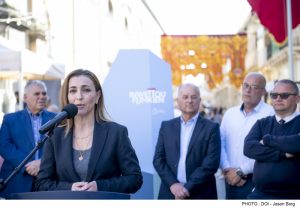For the second consecutive year the Ministry for Agriculture, Fisheries and Animal Rights, in collaboration with the Public Slaughterhouse and the Marsa Local Council, organized a “Meat Festival”.
This year’s activity was built on two cultural pillars, which come together in the Public Slaughterhouse, namely the quality of local meat and the Maltese agro-gastronomic heritage. Among those who took part in this year’s activity was the Cooperative of Pig Breeders with the KIM’s – Pig of Malta product line as well as the Cooperative of Milk Producers with their line of beef products Tari Beef.
The Public Slaughterhouse was present through a stand set up together with the Malta Chef Society which allowed those who attended to taste traditional Maltese products including the kirxa and the mazzit, as well as a number of other products with a long local history but the Maltese consumer no longer consumes as much.
The Minister responsible, Anton Refalo, was present and explained how in recent years the Public Slaughterhouse has invested a lot to improve the quality of the local product as well as to enhance it. He stressed that a strong investment was also made in a new plant for cutting, processing and packaging pork meat, as well as, its treatment so that it does not dry out during cooking; a plant that has been designed to meet hygiene criteria and the necessary separation between one product and another.
Minister Refalo also explained that an investment is also being made to reduce the environmental impact of the operation of the Slaughterhouse. Efforts that have seen the Slaughterhouse reduce the volume of organic waste by approximately 10% as well as reduce electricity consumption by a third.

Parliamentary Secretary for Local Government Alison Zerafa Civelli praised the collaboration between the Marsa Local Council and the Public Slaughterhouse for the organization of this socio-cultural activity. “An activity like today’s gives a clear example of the commitment of the local councils to organize various activities that give life to their respective localities in different ways,” said Alison Zerafa Civelli.
She also encouraged the Maltese and Gozitan people to make use of local products in favor of supporting the work of the villagers and other Maltese producers because they enjoy a fresher, more nutritious and sustainable product.











